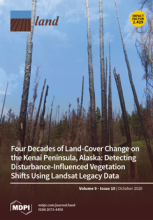Land Library
Bienvenue dans la bibliothèque du Land Portal. Explorez notre vaste collection de ressources en libre accès (plus de 74 000), comprenant des rapports, des articles scientifiques, des articles de recherche, des publications évaluées par des pairs, des documents juridiques, des vidéos et bien plus encore.
/ library resources
Showing items 1 through 9 of 33.Two-thirds of rural Ghanaians are farmers, and farming is almost the only income source for Ghana’s forest-fringe communities. Some farmers adopt some agricultural practices to augment their operations while others do not.
Many actors in agricultural research, development, and policy arenas require accurate information on the spatial extents of cropping and farming practices.
Globally, the agricultural sector is facing many challenges in response to climate change, unsustainable farming practices and human population growth.
This paper reviews the scholarly literature discussing the effect(s) of land registration on the relations between land tenure security and agricultural productivity.
Climate change may increase the importance of agriculture in the global Circumpolar North with potentially critical implications for pristine northern ecosystems and global biogeochemical cycles.
The existence of a “young farmer problem” in Europe has been recognized by scientists and policy-makers and is based on the widespread acknowledgement of the poor generational renewal rates in the farming sector and in particular in farmland management across the European Union.
Mainland Southeast Asia (MSA) has seen sweeping upland land use changes in the past decades, with transition from primarily subsistence shifting cultivation to annual commodity cropping. This transition holds implications for local upland communities and ecosystems.
Long-term slash-and-burn experiments, when compared with intensive tillage without manuring, resulted in a huge data set relating to potential crop yields, depending on soil quality, crop type, and agricultural measures.
Genetically modified (GM) crops have single or multiple genes introduced to obtain crop characteristics that cannot be obtained through conventional breeding.







